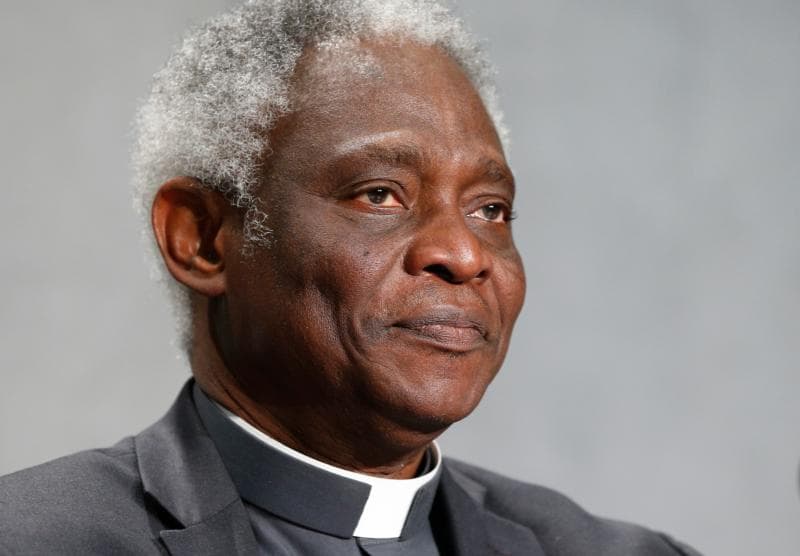Calling Pope Francis a communist is flat out wrong, according to one of his top advisors.
Cardinal Peter Turkson, tapped by the pontiff to head the Vatican’s super-dicastery on integral human develop, said Tuesday that every time he goes to the United States, the pope’s social agenda is misinterpreted as adopting either a socialist or communist approach to the economy.
Speaking to journalists present at a May 14 briefing on the upcoming “Economy of Francesco” event set to take place in Assisi in March 2020, Turkson recalled how after receiving the Charlemagne prize in 2016, Francis was asked what type of economy he preferred.
In response, the pope said he was in favor of “the social economy” – an answer Turkson said was misinterpreted from the beginning, and which continues to be.
A social economy “is not to be confused with the socialist economy,” he said, explaining that “this is a problem we often find in the United States when we go to present the message of the Holy Father. Many accuse him of being socialist or communist.”
Speaking to Crux, Turkson said the concept of the social economy is based on the social doctrine of the Catholic Church, which he said can be a taboo in certain places.
“When you go to certain environments and speak of the social doctrine of the Church, they immediately say, ‘don’t bring your communist agenda here!’ Using the word ‘social’ for some cultures implies socialism, or communism.”
“But this is an intolerable reductionism,” he said, since each person is a member of society, meaning the concept of the Church’s social doctrine “already existed without implying any communism,” and nor does it refer to totalitarian regimes which have arisen throughout history.
“This is not the meaning of the social economy,” Turkson said, stressing what Francis is advocating “is not Adam Smith’s ‘invisible hand,’” invoking the Scottish economist’s image illustrating the unintended social benefits of the self-interested actions of the individual.
Rather, what the pope is promoting is “the very visible hand of fraternity, solidarity and the common good,” he said, adding, “These principles become the visible hand of an economy which is able to serve all members of the community well.”
Turkson spoke at the presentation Tuesday of the March 26-28, 2020, “Economy of Francesco” event, which will be held in Assisi and which will draw young economists and entrepreneurs from all over the world.
In addition to young people, some of the world’s top economists and entrepreneurs are expected to attend the event.
Francis is expected to attend the closing day of the gathering, marking his fourth visit to Assisi – home to his namesake, Saint Francis of Assisi – since his election in 2013. The event will also coincide with the 50th anniversary of the proclamation of St. Francis of Assisi as the patron saint of ecology by Saint John Paul II in 1979.
Stefania Proietti, the mayor of Assisi, was also present at the presentation. Speaking to the press, she said Assisi is excited to welcome Francis again for this “unheard of opportunity.”
“We are really at the end of the line” in terms of the damage being done to the planet, she said, stressing the need to “re-think” strategies and pursue “a new economy” that will protect both people, and the environment.
The fact that the event is being held on the anniversary of St. Francis’s proclamation as patron of ecology, Proietti said, is an opportunity “to re-launch this proclamation” in both the ideas that will be discussed, and the city’s own efforts to clean up before everyone gets to town next spring.
In comments to the press, Archbishop Domenico Sorrentino, who oversees the diocese of Assisi-Nocera, said that the entire event will be an illustration of “the socio-economic magisterium of Pope Francis” spoken about by the pontiff both in his 2013 exhortation Evangelii Gaudium and his 2015 encyclical, Laudato Si’.
Sorrentino said that organizers met with the pope on April 25, and that during the meeting Francis showed “enthusiastic adhesion” to the event, the details of which are still being defined.
However, though it has yet to be confirmed, it is possible the pope will award a prize to young people whose ideas stand out at the gathering. Attendees are also expected to sign a common agreement of shared commitment after the formative part of the event is over.
In a May 1 message to young people eligible to attend the event, the pontiff said that just as St. Francis of Assisi felt the need to rebuild the church of San Damiano at the beginning of his life as a friar, there is an “urgent” need to rebuild mankind’s common home through a more just economy,
“Given this urgent need, each one of us is called to rethink his or her mental and moral priorities, to bring them into greater conformity with God’s commandments and the demands of the common good,” he said.
Francis said he thought specifically of young people and the contributions they can offer through their universities, businesses and organizations, calling them “workshops of hope for creating new ways of understanding the economy and progress, for combating the culture of waste, for giving voice to those who have none and for proposing new styles of life.”
“Only when our economic and social system no longer produces even a single victim, a single person cast aside, will we be able to celebrate the feast of universal fraternity,” he said.














